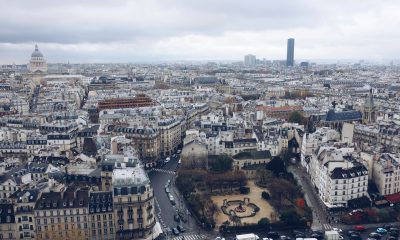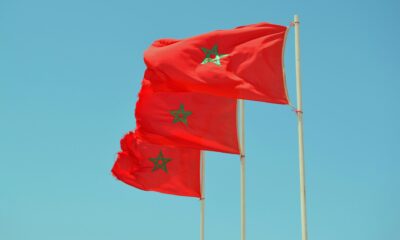Crypto
From Record Sign-Ups to Regulatory Battles: The Worldcoin Rodeo Continues
Since its launch, the Worldcoin project has seen impressive growth, with significant increases in user registrations and application usage. However, the project is also coming under increasing scrutiny, with questions being raised in Europe over the legality of its biometric data collection, and police raids being conducted in Kenya, where it was banned last week, just days after launch.

“You have beautiful eyes, you know?” And they can even earn you some dollars! At least, that’s the promise of Worldcoin and its token, WLD, launched with great fanfare at the end of July.
Since then, queues of people waiting to have their irises scanned for some crypto can be seen worldwide. Scandal, revolution, heresy, the future of digital identity, international scam – what haven’t we heard about Sam Altman’s project!
In any case, how the project is faring depends on where you look in the world and how you view the numbers. Here’s an overview of how things are going.
For more on the rollout of Worldcoin, along with the latest in blockchain developments, download our free crypto news app.
Worldcoin Is a Success, According to the Numbers
According to Worldcoin’s official website, the project aims to become “the largest public network for identification and finance in the world.” And that’s saying something. If we go by the numbers released in recent days by the official blog, they’re on the right path! Indeed, in the week following the launch of the WLD token, weekly verifications increased by 100%. The Worldcoin team is naturally pleased with these excellent results:
“What’s remarkable here is that the World ID verification rate had already doubled once in 2023. Between January and July, World ID registrations indeed went from one to two million. And doubling last week shows a consistent increase in global demand for World ID.”
Furthermore, it’s worth noting that the number of weekly users of the World App has tripled over the same period, while account creations have increased tenfold. As a reminder, World App is the network’s wallet built by Tools for Humanity, which has been openly celebrating these results:
However, the Project Faces Many Criticisms
However, this numerical success is accompanied by numerous criticisms. These concern the distribution and launch of the tokens, the devices used to scan volunteers’ irises, and even the handling of the gathered data.
Indeed, some observers point out that the low percentage of tokens in circulation and the large quantity held by the team and early investors could be a major problem for the project’s long-term viability and especially its price.
Next, there are questions about the devices themselves. The “Orb” aims to become mainstream, decentralized and allow anyone to manufacture it with open-source instructions. This raises concerns about the proliferation of low-quality devices that may not meet safety standards.
But the most significant concern is the handling and storage of data collected worldwide by the Worldcoin project. What happens to the amassed biometric information? To whom is it given or sold? How is it protected? These are highly sensitive questions that led Kenya to ban iris collection, while at the same time, the UK, Germany, and France are openly pondering the issue.
Worldcoin (WLD) Illegal in France: CNIL Clashes with Sam Altman over His Ambitious Project
Questioning Worldcoin’s (WLD) compliance with French regulations regarding its extensive collection of biometric data, the National Commission for Informatics and Liberties (CNIL) has hinted at doubts that could lead to a ban on Worldcoin in France. Let’s delve into this issue that raises so many questions.
CNIL’s Stand Against Worldcoin: Is the Project’s Legality in Jeopardy?
When it comes to Worldcoin, the independent French institution doesn’t hide its distrust from the keen observers of the press, notably our colleagues from Reuters. Questions about Worldcoin’s legality permeate the CNIL. The data collection methods – namely, retinal scans – are particularly under the scrutiny of the agency.
“The data collection techniques deployed by Worldcoin seem tainted with illegality, as does the context surrounding the preservation of biometric information.”
On par with your medical records or partner preferences, the collected data are considered “sensitive” by French law. Hence, they warrant increased vigilance compared to the usual email addresses and phone numbers people tend to share thoughtlessly. The use of this data is, of course, regulated by a specific set of regulations.
What Does French Legislation Say About Biometric Data Processing?
On its website, the French regulatory body is crystal clear about the guidelines for collecting and storing biometric information. Companies are required to adhere to three primary obligations:
- Demonstrate a specific necessity that gives biometric technology the status of a valuable tool rather than a mere gadget.
- Offer the user a choice between using biometric systems or an alternative, without any constraints or financial bargaining.
- Obtain the user’s consent, explicitly given for biometric data collection, not hidden within the folds of a user agreement.
Indeed, it seems that the second point might be where Worldcoin stumbles, according to CNIL’s interpretation. The authority refers to a clear ban on any form of solicitation:
“The user must have the freedom to use another method of identity verification (a simple badge or password, for instance) without any additional hurdles, pressure, and without any quid pro quo. Benefits must not be conditioned on the acceptance of the biometric system.”
Yet, Worldcoin precisely manages to attract users by exchanging WLD tokens for participants’ biometric data. This aspect already raises a plethora of ethical dilemmas concerning Sam Altman’s project. In France, the questions might well evolve into a legislative debate. The legal risks might indeed extend beyond French borders, following CNIL’s line of thought.
In Kenya, Police Seize Worldcoin Warehouses
Worldcoin has also attracted heavy scrutiny in Kenya where, most recently, the Nairobi police carried out a seizure of Worldcoin’s warehouses. This comes after a legal halt to the company’s operations in the country, issued just last week.
Worldcoin, Public Enemy No. 1 in Kenya
According to local authorities, the raid took place a few days after the authorities decided to halt Worldcoin in Kenya, citing concerns over the protection of users’ personal data.
The project, which is based on iris recognition and launched by Sam Altman, is controversial in Kenya. Indeed, Worldcoin offers a crypto project that would utilize blockchain technology to offer a digital passport.
For this, however, it is necessary to scan one’s iris through a futuristic-looking globe. In return, users receive the equivalent of 45€ in crypto. Yet, Worldcoin’s activities have raised suspicions among the country’s authorities who, under the decision of Minister Kithure Kindiki, decided to suspend the group’s activities for an in-depth investigation.
A duly executed police intervention
The police then intervened at a warehouse owned by Worldcoin. The officers were in possession of a valid search warrant when they entered the group’s offices.
According to sources, the authorities broke in on Saturday and left with several machines belonging to Worldcoin. These machines, according to the police, contain user data.
On their side, Worldcoin defends the idea that user data is not physically stored but on the blockchain, as also mentioned in the project’s whitepaper. However, under Kenyan law, individuals have the right not to have unnecessary personal information requested or disclosed.
What future for Worldcoin in the rest of the world?
For now, the Worldcoin case in Kenya remains an isolated incident. However, the raid on Worldcoin’s premises in Kenya primarily highlights a lack of legal framework and a need for clarity regarding the project’s objectives and outcomes. More broadly, it underscores the importance of education about cryptocurrencies and blockchain.
__
(Featured image by Yaroslava Borz via Pexels)
DISCLAIMER: This article was written by a third party contributor and does not reflect the opinion of Born2Invest, its management, staff or its associates. Please review our disclaimer for more information.
This article may include forward-looking statements. These forward-looking statements generally are identified by the words “believe,” “project,” “estimate,” “become,” “plan,” “will,” and similar expressions. These forward-looking statements involve known and unknown risks as well as uncertainties, including those discussed in the following cautionary statements and elsewhere in this article and on this site. Although the Company may believe that its expectations are based on reasonable assumptions, the actual results that the Company may achieve may differ materially from any forward-looking statements, which reflect the opinions of the management of the Company only as of the date hereof. Additionally, please make sure to read these important disclosures.
First published in Journal du Coin, The Blog, and Cryptonaute. A third-party contributor translated and adapted the articles from the originals. In case of discrepancy, the originals will prevail.
Although we made reasonable efforts to provide accurate translations, some parts may be incorrect. Born2Invest assumes no responsibility for errors, omissions or ambiguities in the translations provided on this website. Any person or entity relying on translated content does so at their own risk. Born2Invest is not responsible for losses caused by such reliance on the accuracy or reliability of translated information. If you wish to report an error or inaccuracy in the translation, we encourage you to contact us.

-

 Crypto5 days ago
Crypto5 days agoXRP vs. Litecoin: The Race for the Next Crypto ETF Heats Up
-

 Biotech2 weeks ago
Biotech2 weeks agoVytrus Biotech Marks Historic 2024 with Sustainability Milestones and 35% Revenue Growth
-

 Biotech2 days ago
Biotech2 days agoSpain Invests €126.9M in Groundbreaking EU Health Innovation Project Med4Cure
-

 Crypto1 week ago
Crypto1 week agoRipple Launches EVM Sidechain to Boost XRP in DeFi

























